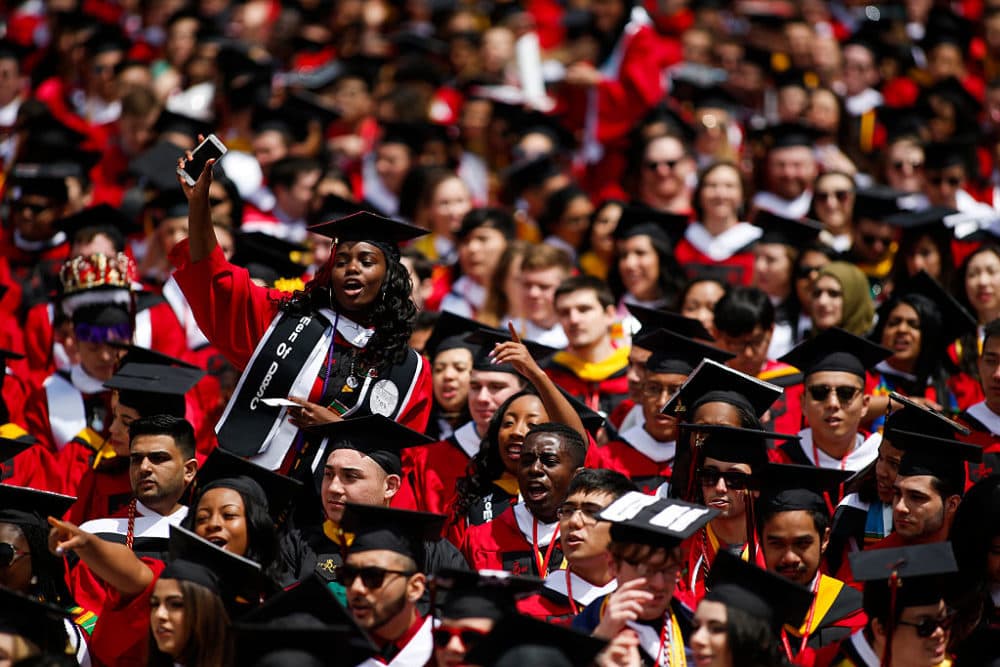Advertisement
Commentary
Biden's Student Debt Plan Is Prudent — And Compassionate

Hard cases make bad law. The PBS NewsHour recently spotlighted pitiable cases of Americans suffocating under college debt whose plight — if it becomes controlling in the loan-forgiveness debate — will produce terrible legislation. (As usual, I speak for myself, not Boston University, my employer.)
Scott Rennie borrowed to earn bachelor’s and master’s degrees in environmental education. He still owes $68,000 in loans, 15 years after graduating, and has yet to pin down full-time work in his field. PBS reports that he scraped by on $27,000 last year as a handyman; and his debt-to-income ratio scared off lenders who might have financed his dream of an outdoor education program.
President Biden would write off $10,000 of loans for Rennie and other student debtors. But Massachusetts Sen. Elizabeth Warren, Congresswoman Ayanna Pressley and other progressives, disposed to fire a blunderbuss when a precision shot would do, introduced a resolution insisting that the president raise the ante to $50,000.
Unsurprisingly, Rennie agrees. “Thanks, Mr. President,” he told the NewsHour, “but [$10,000 is] not enough. We need full cancellation of this debt.” As even the big spenders aren’t offering that, he’s in for disappointment. What they are offering would cost more than Biden’s plan, which might be justifiable were Rennie typical of the 45 million Americans carrying a collective $1.7 trillion in federal student debt.
But he’s not, as the NewsHour pros factually reported: “The biggest beneficiaries of student debt forgiveness would be relatively higher earners.”
Forgiving $10,000 or so ... would target aid to the neediest
Biden’s COVID-19 relief plan, just signed into law, makes any income retained under student loan forgiveness tax-free, upping the pressure to draft forgiveness legislation. That will be foremost in borrowers' and activists’ minds in the run-up to our annual rendezvous with the IRS next month.
So keep these facts in mind: Households making more than $74,000 owe almost 60% of education debt. (The median family income is $78,500.) Households with graduate degrees — tickets to incomes that are enviably better than the median — owe 56% of education debt. Most student debt is incurred by MDs, MBAs, JDs, and bachelor’s degree recipients in business and nursing.
A “Brahmin bailout” of supposedly down-at-the-heels doctors, lawyers and executives troubles even the socialist/social democratic People’s Policy Project (their adjectives, not mine), for the same reason Donald Trump’s tax cuts for the rich troubled anyone who wasn’t in a coma. “Student debt forgiveness boosts the balance sheets of people who attended college,” the People’s Policy Project notes, “while doing nothing for people who did not attend college, even though the latter [are], on average, worse off in many respects.”
That’s why Biden’s proposal passes both the economics and compassion test.
Forgiving $10,000 or so (there might be defensible middle ground between his and the progressives’ bids) would target aid to the neediest: almost every American who borrowed money for college and then dropped out, keeping their debt while forfeiting college’s earnings premium to pay it. They default at triple the rate of degree-holding borrowers.
For those who could have continued college, dropping out was their own, foolish choice, certainly. Why should taxpayers help them? Partly because systemic injustice robs many of a fair shot at affording college and college loans long before they make poor choices. Unremunerated wealth theft in the past and job discrimination in the present hobble Black Americans, who — on descending the graduation platform — typically owe 50% more debt than whites and default at higher rates. Women meanwhile make up two-thirds of student debtors, according to the NewsHour, and contend with the gender wage gap in trying to repay.
Biden’s COVID-19 relief plan ... makes any income retained under student loan forgiveness tax-free
Also arguing for a federal lifeline is the fact that we’ve just come off of a presidential administration that pimped for predatory for-profit colleges. And college shouldn’t be unaffordable to begin with. Rather than indulge progressives who’ve forgotten their opposition to giveaways to the affluent, Uncle Sam would better spend money on making our public universities and colleges tuition-free. (Recall they were created to educate the “sons of toil.”) Financed with existing, federal financial assistance for college, that would simplify and fortify a “scattershot” aid regime.
To his credit, Biden has embraced free tuition. Some advocate that the feds also auto-enroll students in “income-driven repayment” programs that forgive or tailor payments to what people can afford. Throw in reform of our anti-poverty programs to better help people in debt, and Biden’s prudent debt forgiveness, and you have a multiple-fronts campaign to fulfill a legitimate government obligation to the needy.
Not so the promiscuous promises of progressives, intoxicated by go-big thinking sired by one year of expensive crises, and four years of our pathologically uncaring 45th president. The breathing room for government borrowing and spending provided by low interest rates indeed allows us to go big. But spending gobs of taxpayers' money increases the imperative to go wisely as well.
The aforementioned education reforms, along with Biden’s plans for COVID-19 relief, infrastructure and health care, steer a course within big and wise guardrails.
